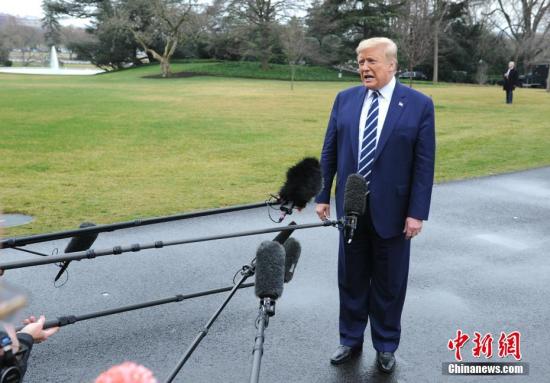China News Service, July 1st. According to the British Broadcasting Corporation (BBC), on June 28th local time, German Foreign Minister Heiko Maas said that the alliance relationship between Germany and the United States is of great significance in terms of economy, defense and security. . But even if Biden stayed in the White House, the deteriorating relationship between virtue and virtue could no longer be restored to its former state.
According to reports, Mas told the German News Agency that structural changes have taken place in German-US relations. NBC Business Channel reported that the United States and Germany are the most influential political and economic blocs in the West, but since Trump became president, US-Germany relations have continued to deteriorate.
Data graph: US President Trump communicates with German Chancellor Angela Merkel. China News Agency reporter Liao Panshe
According to BBC analysis, the differences between the United States and Germany are manifested in many areas of economics, politics, diplomacy and security.
In terms of trade, Trump has always criticized NATO members. Trump once said that tariffs on European car imports would seriously affect Germany, because Germany is the home base of European car production.
Trump's U.S. priority remarks made within the Group of Seven (G7) also caused controversy. Trump's refusal to support the G7 summit communiqué was described by German Chancellor Angela Merkel as "a bit frustrating." Not only that, Trump also withdrew from the Iran nuclear agreement and the Paris climate agreement. Recently, German Chancellor Angela Merkel also rejected Trump's invitation to hold a summit of seven nations in Washington on the grounds of the epidemic.
In addition, Germany's defense spending has also become a major disagreement between Germany and the United States. The NATO agreement reached in 2014 stipulates that the defense budget of NATO member countries should reach 2% of the GDP of their respective countries. According to NATO estimates, Germany’s defense spending in 2019 accounted for 1.38% of its GDP, which triggered US dissatisfaction.
Trump has repeatedly criticized Germany since he was elected president in 2016, saying that Germany does not have enough defense spending. Earlier in June 2020, Trump confirmed that the United States would withdraw 9,500 troops from Germany, saying that it would "reduce the number of soldiers to 25,000." He also said that the US garrison in Germany consumed "a great amount of American expenses."
The White House's plan to reduce its garrison in Germany has raised concerns about the Pentagon. Many in the US military believe that a substantial reduction in garrison in Germany will affect defense against Russia. But the former US ambassador to Germany, trusted by Trump, once serving as acting director of the National Intelligence Agency, Grenell and national security adviser O'Brien strongly supported Trump's withdrawal plan.
Data graph: US President Trump. China News Agency reporter Chen Meng
The relationship between Germany and Russia, especially energy cooperation, is another controversial issue. US officials criticized the Beixi No. 2 natural gas pipeline project that bypassed Ukraine.
Trump said in 2018 that Germany was "fully controlled" by Russia and imposed sanctions on the project in December 2019 when the US was about to complete the Beixi 2 project. But Germany believes that the US sanctions are interference in the internal affairs of Germany and Europe. German Foreign Minister Maas said that Europe’s energy policy should be decided by Europe, not by the United States.
The comment states that if the United States considers imposing further sanctions on Beixi 2, Germany will also take retaliation measures.

